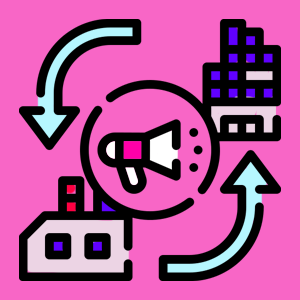 In the competitive world of B2B marketing, staying ahead means leveraging cutting-edge tools and strategies to generate, nurture, and convert leads effectively. Enter artificial intelligence (AI)—a transformative force reshaping how businesses identify prospects, score leads, and drive sales. In 2024, AI-powered solutions are not just supporting lead generation but revolutionizing it.
In the competitive world of B2B marketing, staying ahead means leveraging cutting-edge tools and strategies to generate, nurture, and convert leads effectively. Enter artificial intelligence (AI)—a transformative force reshaping how businesses identify prospects, score leads, and drive sales. In 2024, AI-powered solutions are not just supporting lead generation but revolutionizing it.
This blog explores how businesses are using AI to enhance lead scoring, nurturing, and sales enablement, providing actionable insights for marketers looking to harness its potential.
1. Smarter Lead Scoring with AI
Traditional lead scoring often relies on static rules, leaving room for inefficiencies and missed opportunities. AI is changing the game by introducing dynamic, data-driven scoring models.
How It Works:
- Behavioral Analysis: AI tools analyze a lead’s interactions across multiple touchpoints—email opens, website visits, content downloads—and assign scores based on their likelihood to convert.
- Predictive Analytics: By analyzing historical data, AI predicts which leads are most likely to become customers, prioritizing sales efforts effectively.
- Personalization Insights: AI identifies unique preferences and behaviors, helping marketers tailor outreach for better results.
Example Tool: Platforms like HubSpot and Salesforce Einstein use AI to enhance lead scoring by evaluating complex data patterns in real-time.
2. AI-Powered Lead Nurturing
The days of one-size-fits-all email campaigns are over. AI enables hyper-personalized nurturing strategies, ensuring that leads receive the right content at the right time.
How It Works:
- Automated Content Recommendations: AI suggests relevant blogs, case studies, or webinars based on a lead’s behavior and interests.
- Drip Campaign Optimization: AI-powered platforms analyze the performance of drip campaigns and adjust timing, messaging, and content to maximize engagement.
- Conversational AI: Chatbots and virtual assistants nurture leads in real-time, answering queries, providing recommendations, and directing them through the sales funnel.
Example Tool: Drift and Intercom leverage AI for conversational marketing, enabling real-time lead interactions that feel personalized and human.
3. Streamlining Sales Enablement
AI empowers sales teams by providing actionable insights and tools to close deals faster. In 2024, AI-driven sales enablement is bridging the gap between marketing and sales like never before.
How It Works:
- Intelligent CRM Systems: AI enhances customer relationship management (CRM) systems by automating data entry, summarizing interactions, and providing next-step suggestions for sales reps.
- Sales Forecasting: Predictive models forecast revenue and identify the most promising deals, helping teams focus on high-impact opportunities.
- Enhanced Prospecting: AI tools scour data sources to uncover new leads and provide detailed profiles, saving time on research.
Example Tool: Gong and Outreach.io use AI to analyze sales conversations, offering actionable insights to improve closing rates.
4. Predictive Lead Generation
AI doesn’t just improve how businesses handle leads—it’s also transforming how they find them. Predictive lead generation uses AI to identify and attract high-quality prospects before they actively express interest.
How It Works:
- Audience Targeting: AI analyzes data from various sources, such as social media, website traffic, and third-party databases, to create hyper-accurate target audience profiles.
- Lookalike Modeling: AI identifies prospects who share similar traits with your existing high-value customers.
- Programmatic Advertising: AI optimizes ad placements, ensuring they reach the right audience at the right time for maximum impact.
Example Tool: 6sense uses AI to uncover in-market buyers and predict their readiness to purchase, driving proactive outreach.
5. Actionable Analytics for Continuous Improvement
AI’s ability to analyze massive datasets means marketers can make data-driven decisions with unprecedented speed and accuracy.
How It Works:
- Real-Time Insights: AI tools provide instant feedback on campaign performance, enabling marketers to pivot strategies quickly.
- Attribution Modeling: AI tracks every touchpoint in the buyer’s journey, showing which efforts drive the most conversions.
- ROI Optimization: By analyzing costs and outcomes, AI highlights where marketers should focus their budgets for the best return.
Example Tool: Marketo Engage delivers detailed insights into campaign performance, empowering marketers to refine their strategies continuously.
Best Practices for Leveraging AI in Lead Generation
- Integrate AI Across Tools: Ensure seamless integration between AI-powered marketing platforms and existing CRM or analytics systems.
- Start Small, Then Scale: Begin with specific use cases, such as lead scoring or campaign optimization, before expanding AI’s role in your strategy.
- Invest in Training: Equip your marketing and sales teams with the knowledge to use AI tools effectively.
- Measure and Iterate: Regularly evaluate AI’s impact on lead generation metrics and refine your approach accordingly.
What’s Next for AI in B2B Marketing?
As AI technology advances, its role in B2B marketing will only grow. Here’s what we might see in the near future:
- AI-Powered Account-Based Marketing (ABM): More precise targeting and personalization for high-value accounts.
- Voice AI for Outreach: Enhanced AI tools for analyzing tone and sentiment in voice interactions with prospects.
- Generative AI in Campaign Design: Automated creation of entire campaigns, including visuals and copy, tailored to target audiences.
Conclusion
AI is no longer a luxury in B2B marketing—it’s a necessity. From smart lead scoring to predictive lead generation, businesses leveraging AI tools are gaining a competitive edge by working smarter, not harder. By integrating AI into your lead generation strategy, you can unlock higher-quality leads, more personalized nurturing, and better sales outcomes.
